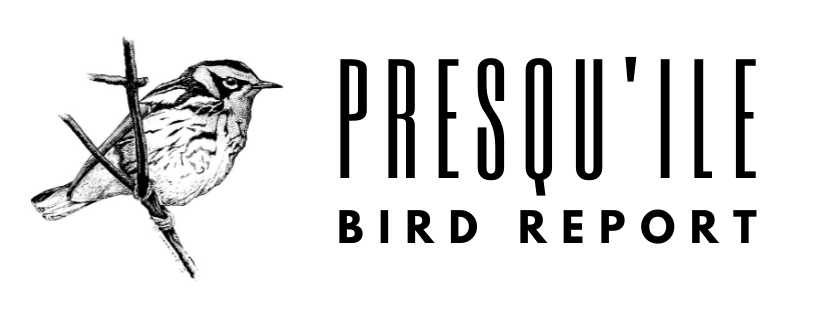
HIGHLIGHTS: Buff-breasted Sandpiper, Forster’s Tern, Yellow-throated Vireo
OVERVIEW: Migration is strong with lots of birds moving through. Waterfowl numbers are building with more puddle ducks and diving ducks, mostly around the islands and Popham Bay off the beach. Birds of prey, especially Sharp-shinned Hawk and Merlin, are being seen daily. Shorebird diversity has been pretty good although total numbers remain a fraction of the numbers that used to gather here several decades ago. Songbirds have been obvious all week with many parties tallying 15-20 species of warblers in a day. All the spotted thrushes were reported this week, and several flycatchers are still about, especially Eastern Phoebe, which has not yet peaked. Sparrows are also more obvious and now include flights of Dark-eyed Junco and White-throated Sparrow from the north. Finally, there is a puddle in the roadway at the back of the Park Store that has been attracting bathing birds, especially warblers, all week affording excellent views of multiple species together.
The access restrictions (to protect nesting colonial birds) to Gull Island were lifted on Saturday. The crossing is fairly easy being knee deep at the deepest point, about 100m in distance, and on a flat gravel base. Note that the current through this channel is constantly changing in both direction and intensity so be vigilant.
SIGHTINGS:
Northern Shoveler: A high count of 10 was reported on 12 Sep.
White-winged Scoter: A single was seen on 12 Sep and two more on 15 Sep; more should be appearing soon.
Ruffed Grouse: An individual was heard drumming on 15 Sep.
Horned Grebe: Twelve on 12 Sep were the first of fall with numbers building to a high of 35 on 15 Sep.
Red-necked Grebe: Following a very early report last week, more birds were seen through the week with unusually high counts of 26 on 11 Sep of 35 the next day.
Green Heron: One was still present on 15 Sep.
Black-crowned Night-Heron: Even though they breed here in numbers, birds tend to slip away early after nesting; one seen on 12 Sep was the first report in several weeks.
Sharp-shinned Hawk: Migrants were seen daily with a high count of 38 on 16 Sep.
American Golden Plover: Seen through the week in ones and twos on Gull Is. and the beach.
Stilt Sandpiper: Two were seen on 16 Sep.
Buff-breasted Sandpiper: A particularly richly coloured individual of this annual rarity was spotted on 14 Sep on Sebastopol Is. (rock shoal north of Gull Is.), then seen by many on Gull Is. through to 16 Sep.
Common Tern: For some reason this species leaves our area shortly after nesting so sightings of two on 12 Sep was noteworthy.
Forster’s Tern: An immature was seen off the Government Dock on Bayshore Rd. on 16 Sep. This species used to be annual in small numbers through the 1980’s and 90’s but has been very scarce in the past two decade with only a handful of sightings.
Black-billed Cuckoo: This is a bird that tends to slip away unnoticed so a single on 13 Sep was of interest.
Common Nighthawk: Three on 15 Sep and two the next day may well be the last of fall.
American Kestrel: Migrating birds were seen through the week with a highs of 5 on 11 Sep and 8 on 16 Sep.
Peregrine Falcon: One or two were seen through the week, especially around the islands. Much is written about this species’ speed and agility and this was graphically displayed on 15 Sep when two immatures (male and female based on size difference) chased an immature Ruddy Turnstone over water and land for five minutes leaving a group of experienced birders gobsmacked. One falcon would try to force the turnstone higher while the other would dive at speed from above. The aerial acrobatics by all three birds was astounding. Eventually the turnstone escaped by dropping down into a tightly packed group of roosting cormorants for safety. Despite the falcons flying back and forth just over the cormorant’s heads, they didn’t budge and the turnstone lived for another day.
Yellow-bellied Flycatcher: One of these inconspicuous migrants was seen on 13 Sep.
Yellow-throated Vireo: Singles of this very scarce migrant were seen on 11 Sep, 13 Sep and 15 Sep.
Tree Swallow: The first report in several weeks was a single on 16 Sep. As with many of the swallows, this once common species now occurs in greatly reduced numbers.
American Pipit: Present all week on Gull Is. with a high of 11 on 11 Sep.
Mourning Warbler: Singles of this inconspicuous species were seen on 11 Sep and 12 Sep.
Northern Parula: Good numbers seen through the week with high counts of 11 on 11 Sep and 13 on 12 Sep.
Blackburnian Warbler: Seen through the week with a high count of 12 on 15 Sep.
Yellow Warbler: Normally this species is gone by Labour Day but for some reason birds continue to be seen through the week with singles by two parties on 16 Sep.
Blackpoll Warbler: Seen through the week with a high count of 16 on 15 Sep.
Brown-headed Cowbird: Although very common in spring and early summer, this species actually becomes quite difficult to locate in the fall except for a small group that traditionally gather on Gull Is. Numbers peaked at 13 on 16 Sep.
Purple Finch: The first report in several weeks was a single on 16 Sep.
Please Note: Access to Gull and High Bluff Island is closed to visitation between 10 March and 10 September to protect the thousands of colonial birds that nest on the islands.
Directions: Presqu’ile Provincial Park is located south of Brighton on the north shore of Lake Ontario. It is well signed from either Hwy. 401 or Cty. Rd. 2.


